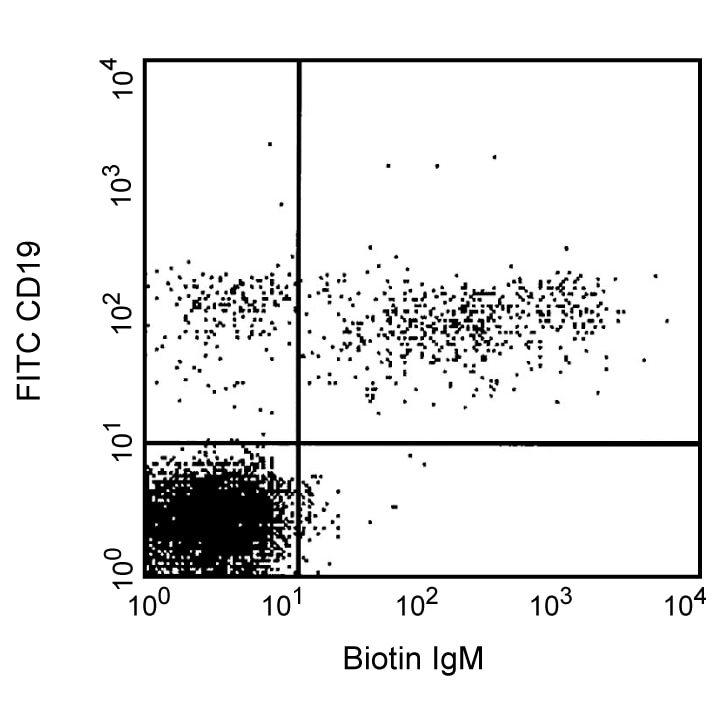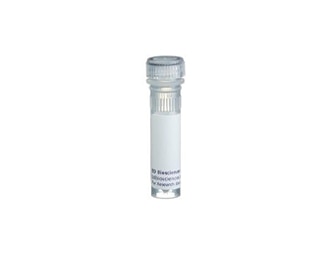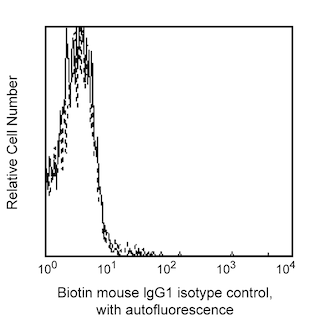Old Browser
This page has been recently translated and is available in French now.
Looks like you're visiting us from {countryName}.
Would you like to stay on the current country site or be switched to your country?




Profile of peripheral blood mononuclear cells (lymphocyte gate) analyzed on a FACScan (BDIS, San Jose, CA)


BD Pharmingen™ Biotin Mouse Anti-Human IgM

Regulatory Status Legend
Any use of products other than the permitted use without the express written authorization of Becton, Dickinson and Company is strictly prohibited.
Preparation And Storage
Recommended Assay Procedures
For the sandwich human IgM ELISA, biotin conjugated G20-127 is optimal for detection when using mAb with purified JDC-15 (Cat. No. 555856) as a capture antibody.
Product Notices
- Since applications vary, each investigator should titrate the reagent to obtain optimal results.
- Please refer to www.bdbiosciences.com/us/s/resources for technical protocols.
- Caution: Sodium azide yields highly toxic hydrazoic acid under acidic conditions. Dilute azide compounds in running water before discarding to avoid accumulation of potentially explosive deposits in plumbing.
Companion Products

.png?imwidth=320)
IgM is an important component in the first line of defense against foreign pathogens, but may also play a role in autoimmune diseases. IgM monomers consist of two light and two heavy chains. Unlike the heavy chain of an IgG antibody which contains 3 constant Ig domains, the µ heavy chain of IgM contains 4 constant Ig domains. Five IgM monomers complex with a small polypeptide (J-chain) to form pentameric IgM that can be found in human plasma. In an immune response, the binding of IgM to a cell surface antigen enables C1q to activate interactions with downstream components in the classical complement pathway. Mature B lymphocytes express IgM. The G20-127 monoclonal antibody binds to the heavy chain of human IgM. The G20-127 antibody is not thought to react with other immunoglobulin heavy chain isotypes.
This antibody is routinely tested by flow cytometric analysis. Other applications were tested at BD Biosciences Pharmingen during antibody development only or reported in the literature.
Development References (2)
-
Guesdon JL, Ternynck T, Avrameas S. The use of avidin-biotin interaction in immunoenzymatic techniques. J Histochem Cytochem. 1979; 27(8):1131-1139. (Biology). View Reference
-
Zola H, Macardle PJ, Flego L, Webster J. The expression of sub-population markers on B cells: a re-evaluation using high-sensitivity fluorescence flow cytometry. Dis Markers. 1991; 9(2):103-118. (Biology). View Reference
Please refer to Support Documents for Quality Certificates
Global - Refer to manufacturer's instructions for use and related User Manuals and Technical data sheets before using this products as described
Comparisons, where applicable, are made against older BD Technology, manual methods or are general performance claims. Comparisons are not made against non-BD technologies, unless otherwise noted.
For Research Use Only. Not for use in diagnostic or therapeutic procedures.
Report a Site Issue
This form is intended to help us improve our website experience. For other support, please visit our Contact Us page.